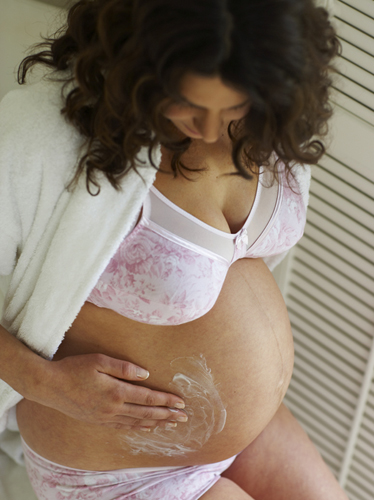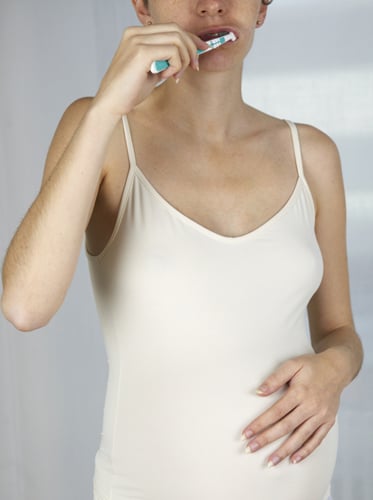In addition to affecting what happens to you internally, hormonal changes in pregnancy can also affect your external appearance.
Many women look and feel
better than ever during pregnancy, while those less fortunate report
that there is a downturn in their appearance. However pregnancy affects
you, the changes will be temporary and you’ll be back to your normal
self soon after the birth.
Skin
You may find that your
skin looks better in pregnancy due to hormonal changes, mild fluid
retention, and increased blood flow. These can all result in smoother
skin and are responsible for the famous “pregnancy glow.” On the other
hand, you may find that your skin gets drier and more pimply and you may
need to take extra care of it during pregnancy.
Skin also tends to
darken during pregnancy, although the cause for this is unknown. One
possible explanation is the increased levels of estrogen and
melanocyte-stimulating hormone, which stimulate skin pigmentation.
Stretch marks (striae gravidarum)
Many women develop
stretch marks during pregnancy, which can occur on bellies, breasts,
hips, or legs. These initially appear as pink or purple lines and may be
quite itchy. After pregnancy they fade into pale wrinkles. Nobody knows
for sure why these occur, but they probably result from a combination
of pregnancy hormones and your skin stretching. You’re more likely to
get stretch marks if you’re very young, if you gain a lot of weight in
pregnancy, or if you have a very big baby. There is less agreement about
the role of other factors such as a family history, being very
overweight before pregnancy or belonging to a particular ethnic group.
Many creams, lotions,
and oils have been marketed for the prevention or treatment of stretch
marks but none has been proven to work. Studies have shown that some
creams containing ingredients such as vitamin E, elastin,
collagen-elastin hydrolysates, and menthol can reduce the development of
stretch marks; but other trials have shown that creams containing
vitamin E had no effect. If you want to use a commercially recommended
cream, lotion, or oil, they are safe to use and may help prevent stretch
marks, but unfortunately there is no guarantee.
Applying moisturizing creams to relieve dry, itchy skin, or ones recommended to reduce stretch marks, is safe during pregnancy.

Chloasma
This
describes the increased pigmentation of the cheeks, nose, and chin that
affects around 50–70 percent of pregnant women. Using a protective
sunscreen and avoiding the use of any photosensitizing skin-care
products may reduce chloasma. A recent study found that using a highly
protective sunscreen (SPF 50 and UVA-PF 28) prevented most pregnant
women from developing chloasma.
Hair and nails
Hair stays longer in the
growth phase during pregnancy, meaning that your scalp hair is likely
to grow and thicken. Not so welcome is the fact that facial and body
hair may also increase. After the birth, many women find that they
suddenly lose a lot of hair as the growth phase stops. You should find
that your hair is back to normal within six months.
Fingernails may also
change, often becoming stronger, although some find that they become
softer and brittle. Nails may develop white spots or transverse grooves,
but these are rarely anything to worry about and don’t mean that you’re
lacking in vitamins.
Teeth
Pregnant women are
more prone to tooth decay (dental caries), bleeding gums, and chronic
gum infection (periodontal disease). Poor dental health not only affects
you, but can also have an impact on your baby. Studies have linked
infection of the gums in pregnant women to premature birth, and if a
woman has ongoing tooth decay after the birth, her baby may acquire
bacteria directly from her saliva, leading to tooth decay in the child
later on. It’s therefore important that you take care of your teeth
during pregnancy and visit your dentist and dental hygienist regularly.
To keep your mouth
healthy during pregnancy, brush twice a day with fluoride toothpaste and
floss every day. Routine dental treatment and some local anesthetics
are safe in pregnancy, although it’s better to postpone elective dental
treatments until after pregnancy or take care of them before pregnancy.
Many women worry about having their teeth x-rayed in pregnancy. The
radiation exposure from dental X-rays is minimal and the risk to your
baby probably negligible. However, dentists will take every precaution
to minimize your radiation exposure, covering you with a leaded apron
before the X-rays.
Taking good care of your teeth and gums is important during pregnancy, when you’re more susceptible to dental problems.

| Q: |
I am 18 weeks’ pregnant and due to go on a beach vacation. My
facial and body hair has grown and become very unsightly. How can I
safely remove it?
|
| A: |
You can safely tweeze, wax, and shave new stray hair. Skin
bleaching and hair removal creams are probably safe during pregnancy,
but there has been insufficient research to clear them since they can be
absorbed through the skin and their effects on the baby are unknown.
Permanent hair-removal techniques, such as laser and electrolysis, are
thought to be safe in pregnancy. Both techniques penetrate the skin no
deeper than a few millimeters. Consult your doctor to see if this is
okay.
|
| Q: |
I’ve been using topical cream to treat acne and I’ve just found out that I’m pregnant. Will it harm my baby?
|
| A: |
Tretinoin belongs to a group of medications called retinoids
that contain vitamin A and may be associated with birth defects. Studies
have looked at the effects of this cream in pregnancy and have found
that babies whose mothers used it, even in the first trimester, had no
increase in birth defects. However doctors recommend avoiding tretinoin
cream in pregnancy. Another similar medication, isotretinoin, which is
taken orally, may increase the risk of birth defects and is therefore
contraindicated in pregnancy.
|
| Q: |
I’m in the first trimester and will be going to my sister’s wedding. Can I have highlights put in my hair?
|
| A: |
Although the research into the safety of hair dyes if used in
the first trimester may seem conflicting, the amount of chemicals used
is small and it’s unlikely that hair dyes cause harm. Also, if your
hairdresser uses foil, the dye is kept off your skin.
|
| Q: |
I’ve heard that nail polish needs to be removed if you have a cesarean. Why is this?
|
| A: |
Previously, women were encouraged to remove nail polish before
surgery. One of the reasons was that the “pulse oximeter,” a device
attached to your finger to measure the oxygen in your blood during
surgery, may give lower readings if placed over nail polish. However the
device works as intended with nail polish or long nails if it’s mounted
sideways on a finger. Therefore there’s no need to remove your polish.
|
What’s safe and what’s not
Beauty treatments and cosmetics
The following advises which products and treatments are safe in pregnancy.
Hair and nail products
Shampoos,
conditioners, manicures, and pedicures are safe. Minute amounts of hair
dye may be absorbed through the skin, but there’s no evidence that this
affects the baby. Chemical hair straighteners and curlers are also
thought to be safe.
Piercing
Facial
piercing or piercing the belly button, nipples, or genitalia isn’t
advised since you’re at a higher risk of infection. If you have a navel
piercing already, you can change a metallic ring for a flexible plastic
retainer made from PTFE (polytetrafluoroethylene). Nipple rings can
affect breast-feeding, so remove a ring before birth so the skin can
heal. Vaginal or vulval piercings are best removed to avoid damage at
birth.
Tanning
Tanning
beds aren’t advised because of harmful UV rays. Tanning beds can cause
your body to overheat, which can harm your baby, and UV rays may break
down folic acid. Tanning lotions are safe.
Body wraps/Hot tubs
These
raise body temperature, which is unsafe for you and your baby. Heat
exposure from a hot tub in the first three months can increase the risk
of a baby developing spina bifida.
Facials
The cosmetics used for facials are thought to be safe.
Botox
The
Food and Drug Administration recommends that women who are pregnant or
breast-feeding should not use Botox. Although it’s used for cosmetic
reasons, it is a drug and should be considered as such. Doctors also
advise avoiding Botox during pregnancy.